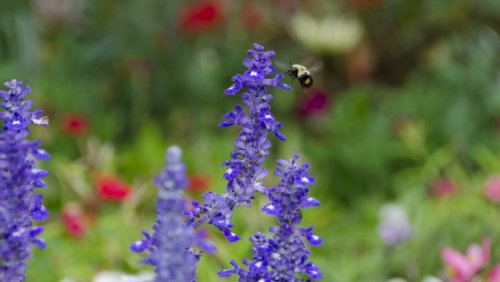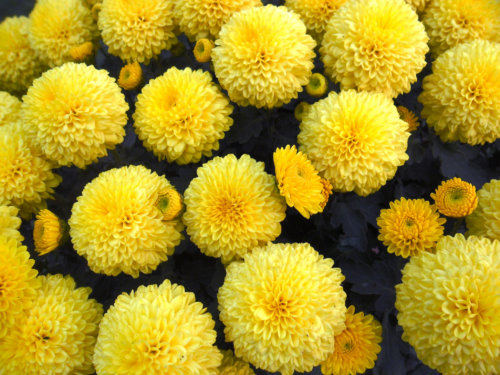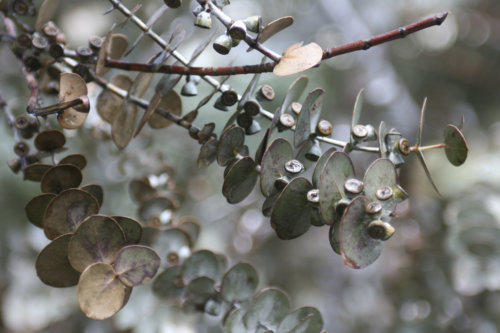
A Home Gardener’s Guide To Safe, Bee-Friendly Pesticides
Looking for a way to fight pests or weeds in your garden? Many popular insecticides and weed killers are labeled as nontoxic and “biodegradable,” but recent science has shown otherwise.
Monsanto’s popular glyphosate-based herbicide, Roundup, for instance, has been proven to suffocate human cells, and has been linked to an array of health problems like cancer, autism, heart disease, and depression.
Not only do these toxic chemicals affect human health, but they have also been proven to be a major cause of Colony Collapse Disorder, the phenomenon that occurs when honeybees die off at record rates.
Studies have shown that when a bee lands on a flower treated with many popular and much-advertised pesticides, they attack the bee’s central nervous system, disorienting it, and damaging its thinking and memory. Bees poisoned by pesticides will struggle and often fail to find their way back to the hive, and thus the colony collapses.
Given that bees are our main pollinator, it doesn’t make sense to use pesticides that have been proven to kill them, especially when there are alternatives that are safe, easy to use, and cost effective. Chances are you’ve already got some of these tucked away in your pantry.
Neem Oil
Derived from the Azadirachta indica evergreen tree native to the Indian subcontinent, neem has been hailed as the organic gardener’s best friend. While highly effective at repelling a variety of pests such as mites and aphids, as well as certain fungal diseases like powdery mildew, organic neem oil, when used at correct doses, will pose no threat to people or pollinators.
Unlike chemical pesticides, neem is biodegradable, breaks down quickly, and leaves no lasting residue. Neem oil is powerful, so be sure that your homemade solution is properly diluted- it should include no more than 3% oil.
Vinegar
Due to their acidic nature, both white wine vinegar and apple cider vinegar can be used as effective weed killers. Fill up a watering can or spray bottle and apply it directly to the difficult weeds you’d like to nix. You can also mix up a little cocktail of one gallon vinegar, with one cup Epsom Salt, and a tablespoon of castile soap.
Epsom Salt
An ideal component of any organic garden, Epsom salt is completely safe, non-toxic, and bee-friendly. In addition to being a magnesium-rich fertilizer for tomato and pepper plants, Epsom salts are also an effective way of keeping slimy critters like slugs and snails off your plants. Simply sprinkle salt around the base of affected plants, or apply a half-water, half-salt saline spray to the leaves of plants affected by other pests, like beetles.
Chrysanthemum
Naturally containing a pest-repelling compound called “pyrethrin,” Chrysanthemums can be planted in a garden to repel pests, or made into tea that can be sprayed onto the leaves of plants (after it’s cooled down, of course.)
Pepper, Garlic, and Onion
Just as pepper spray is harsh for human skin, at milder concentrations, it works similarly on the bodies of insects. A handful of chili or habanero peppers, garlic, or onions can be pulverized in a blender with a few cups or water, boiled over the stove, then cooled and transferred to a gallon container. Add extra water to make sure you don’t burn your plants, and be sure to wear gloves and protect your eyes when making this mixture.
Castile Soap
Given its much-lauded gentleness and non-toxicity, it might come as a surprise that castile liquid soap is a potent pesticide. Its effectiveness stems from the fatty acids present in the olive oil-based soap, so be sure to use the real deal; dish soaps and detergents will be both ineffective and harmful here.
Mix up a solution with only about 2% soap, and feel free to add a little cooking oil, vinegar, neem oil, or pepper to the mix.
Aluminum Foil
Don’t want to throw out the aluminum foil left over from that dinner you made last night? You can re-use it in the garden to repel aphids. Cut the foil into strips and wrap them around the base of plants affected, or tear it up and mix it in with the mulch around your plants. The light reflections will confuse pests and drive them away.
Essential Oils
An important component of many natural insect repellents intended for bodily use, eucalyptus oil is also an effective method of keeping harmful bugs away from your garden.
Strong, pungent smells are what works here. Other essential oils to use include orange, peppermint, and rosemary. Sprinkle a few drops around the area, or add them to a spray bottle full of water, and apply directly to the endangered plants.




































